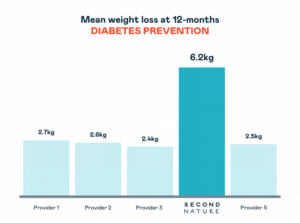Constipation occurs in around 25% of participants taking semaglutide. Unlike nausea and vomiting, which are typically more transient, constipation (for those who experience it) appears to be a longer-lasting side effect of Wegovy.
Constipation may occur due to reduced muscle contractions in the colon when taking the medication.
Diarrhoea is also prevalent with Wegovy, with around 30% of participants experiencing this at least once.
It’s typically transient and should decrease as your body adapts to the medication. The causes of diarrhoea on Wegovy aren’t fully understood.
Surprisingly, much of the guidance to help constipation will also help manage and prevent diarrhoea.
3) Rare side effects
Thyroid cancer and thyroid-related disorders
A recent meta-analysis (a study reviewing many studies on one topic) analysed the risk of thyroid cancer (and other thyroid-related conditions) associated with the use of GLP-1 receptor agonists like semaglutide (Wegovy) and liraglutide (Saxenda).
The results indicated that liraglutide (Saxenda) slightly increases the risk of thyroid-related disorders compared to a placebo.
This connection to the thyroid with liraglutide is well-documented in the literature, and individuals with a family history of thyroid cancers and related disorders shouldn’t take liraglutide.
Another GLP-1 dulaglutide was also shown to increase the risk of thyroid cancer and related disorders. It’s essential to note that these are rare side effects, and the overall risk is still minimal.
However, semaglutide (Wegovy) was shown to have no impact on the risk of thyroid-related disorders.
Despite this, current recommendations are the same as liraglutide and individuals with a history of thyroid disorders aren’t recommended to take semaglutide.
It’s likely that when more data becomes available, we’ll have a clearer picture of whether Wegovy affects thyroid function and the development of thyroid disorders.
Pancreatitis and pancreatic cancer
Despite the current guidelines against individuals with a history of pancreatic cancer or pre-existing pancreatic conditions, there’s no strong evidence that semaglutide, or other GLP-1 medications, increases the risk of pancreatitis, pancreatic cancer or other pancreas-related conditions.
A study analysed data from 100 randomised controlled trials on GLP-1s and found that 72 of those trials showed no difference between the incidence of pancreatic cancer or pancreatitis compared to the control groups.
Another study analysed the available data on randomised controlled trials that investigated the incidence of pancreatic cancer and pancreatitis on semaglutide specifically and showed no effect of semaglutide on pancreatic-related conditions.
Still, a potential link between pancreatic function and semaglutide can’t be completely ruled out. But based on the currently available data, it doesn’t seem to increase the risk of these conditions.
It’s possible that earlier associations between GLP-1s and pancreatic cancer and pancreatitis were confounded by the increased risk of these conditions in the baseline population of people living with type 2 diabetes who are prescribed these medications.
Additionally, using semaglutide has been shown to significantly improve insulin sensitivity and the ability of pancreatic beta-cells to produce and secrete insulin.
So, it’s likely that the benefits to glucose management and insulin sensitivity observed with semaglutide outweigh any potential risks associated with pancreatic cancer in the long term.
Fatigue
Interestingly, few of the major trials investigating the impact of Wegovy on weight loss and health report fatigue, tiredness, or lethargy as potential side effects.
However, there are widespread reports that fatigue is a very common side effect linked to its use.
One earlier phase 2 trial on higher-dose semaglutide (1.6mg) indicated that around 12% of participants reported fatigue whilst on the medication. But generally, it’s not a side effect reported in the larger phase 3 trials.
Whether this is due to poor reporting or the researcher’s decision that the fatigue isn’t associated directly with the medication is unclear.
It’s likely due to an indirect effect of the medication reducing appetite to a point where people don’t eat enough, and their bodies enter ‘starvation mode’ whereby metabolism effectively grinds to a halt to ensure sufficient energy delivery to vital organs.
Here are our top tips to prevent and manage fatigue on Wegovy:
- Eat enough in your meals, and include snacks in between meals if needed
- Ensure a source of protein at each meal
- Aim to eat 5-9 servings of fruit and vegetables a day
- Stay hydrated
- Consider taking a multivitamin
- Get daylight exposure, particularly in the morning
- Aim to sleep 7-9 hours per night
- Avoid caffeine after midday if you’re caffeine sensitive
- Speak to your doctor or prescribing physician if symptoms persist or become too uncomfortable
Take home message
The recent innovations in GLP-1 medications are pretty remarkable and have caused quite a stir in the world of healthcare.
We’re in new territory where obesity and type 2 diabetes medications treat an underlying cause instead of merely treating the symptoms to support better management.
However, these drugs shouldn’t be seen as miracle cures; they’re not designed to be used for life.
They’ve been designed to be taken alongside lifestyle changes that will enable you to eventually come off the medications and maintain your lower weight for the long term.
The harsh reality is that we still don’t know the long-term effects of these medications on our health. There are examples of drugs being withdrawn from the market as more long-term data comes to light.
Lorcaserin was a weight loss drug approved by the Food and Drug Administration (FDA) in the U.S. but was recently withdrawn as data indicated that it increased cancer risk.
The example of lorcaserin is why you must weigh the pros and cons when your doctor prescribes medication or before you purchase it yourself and start treatment. Report any side effects to your healthcare team.
GLP-1s are safe and effective for most people in the short to medium term, but we don’t have long-term data to be sure they’re not causing severe adverse effects elsewhere.
If you’re considering taking Wegovy for weight loss, weighing up the pros and cons of the medications and understanding your experience will be different to others.





